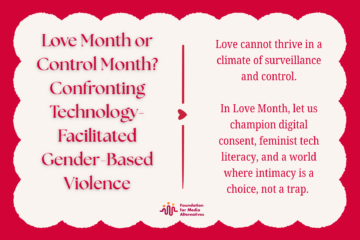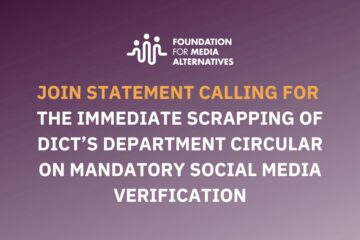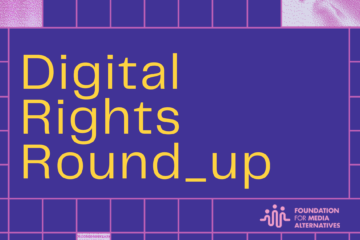FMA at Miriam College’s Cybersecurity Seminar: Understanding Why We Post and How to Stay Safe Online
Published by Foundation for Media Alternatives (FMA) on
FMA at Miriam College’s Cybersecurity Seminar: Understanding Why We Post and How to Stay Safe Online
Every post we share online tells a story about who we are – our interests, emotions, opinions, and even our routines. For many of us, social media has become a daily space for self-expression, connection, and community-building. Yet each post also carries a certain level of risk, especially when shared without reflection or boundaries.
As a representative of the Foundation for Media Alternatives (FMA), I had the privilege of speaking at Miriam College’s Cybersecurity Seminar, “Huwag RECKLESS Para STRESSLESS,” held on November 6, 2025, at the Miriam College Innovation Center. Invited as a resource speaker for the session, I shared insights on the topic “Why Do I Post? Understanding Our Online Behaviors for Safer Digital Lives.”
Through this session, I was honored to contribute to Miriam College’s meaningful initiative in promoting informed, responsible, and secure social media practices – an effort that aligns closely with FMA’s advocacy for digital rights, online safety, and gender justice.
Why Do We Post?
According to research on the psychology of online behavior, people post for many reasons:
- Self-expression and identity: to share creativity, experiences, or opinions.
- Validation and belonging: to seek affirmation and connection.
- Information and curiosity: to share news or participate in trends.
- Habit and entertainment: because scrolling and posting have become part of our routines.
These motivations are valid but they also shape what and how much we share. Understanding these drivers helps us pause before posting, especially when content might reveal sensitive details or personal data that can be misused.
The Risks of Oversharing and TFGBV in the Philippines
Online sharing becomes risky when it exposes personal information. The real-time locations, school names, IDs, or travel plans can be exploited by others.
In the Philippines, these digital habits intersect with a growing concern: technology-facilitated gender-based violence (TFGBV). According to data from the Foundation for Media Alternatives, TFGBV continues to rise, with common forms including the non-consensual sharing of intimate images, threats or blackmail, and identity theft.
Many of these cases begin with something shared in trust, a photo, a post, or a private message, later taken out of context or used without consent. The reality reminds us that privacy is not just a setting, it is a form of self-protection.
Toward Safer, Stressless Posting
Safety online means more than avoiding scams or protecting passwords. It is about being able to express ourselves freely without fear of harassment, surveillance, or harm. True safety is holistic, combining digital, emotional, and community well-being.
FMA promotes three golden rules for safer, stressless posting:
- Pause Before You Post. Would you share this with a stranger? Think before clicking.
- Lock Down Your Settings. Privacy is power. Secure your accounts with strong passwords and two-factor authentication.
- Own Your Digital Footprint. You are the author of your online story. Own it intentionally.
Building a Culture of Care and Digital Safety
As members of digital communities, our online choices shape collective safety. Using privacy tools, reporting abuse, supporting peers, and promoting respect in online interactions are all forms of digital care.
Being stressless online doesn’t mean being silent. It means being smart, intentional, and compassionate, because our safety and dignity are worth far more than a like.#
This article was written by Christina Lopez for the Foundation for Media Alternatives (FMA). Christina is currently a Program Officer and Digital Security Trainer, advocating for safer and more inclusive digital spaces for women and marginalized communities.



0 Comments